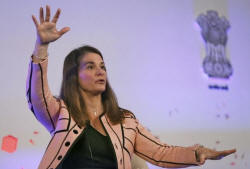|
Q&A: Melinda Gates
explains why charity cannot wait
 Send a link to a friend
Send a link to a friend
 [January 27, 2017]
By Chris Taylor [January 27, 2017]
By Chris Taylor
NEW
YORK (Reuters) - One of the biggest ways that Bill and Melinda Gates
have revolutionized the world of philanthropy was to start giving away
their Microsoft Corp fortune before they were old.
For the latest in Reuters' Life Lessons series, Melinda Gates sat down
to talk about the principles that have guided a life of extreme success
and the vast responsibilities that come with that.
Q: Growing up in Dallas, who were your biggest influences in passing
along life lessons about money?
A: One was my high school math teacher, Susan Bauer, who, and this is
amazing, was raising three boys while also getting her PhD in computer
science at night. She could tell that there was going to be a lot of
opportunity in tech, and she wanted her students to have a part in that.
So Mrs. Bauer persuaded the head nun at my all-girls Catholic high
school to buy us computers and started teaching us to code, an idea way
ahead of its time. I'll always be grateful to Mrs. Bauer for helping
spark my interest in computer science and setting me on the path to my
career at Microsoft.
Q: What kind of jobs did you have as a teen, and what did you take away
from those experiences?
A: One of my first high school jobs was teaching kids computer
programming. I learned something about myself: I realized that I got a
lot of satisfaction from helping unlock the best in these kids and push
them to reach their full potential. It is what I eventually ended up
doing at Microsoft, where I helped lead teams of programmers.

Q As a marital team, do you and Bill have a philosophy about money you
try to embody in your lives?
A: Even before we were married, we decided together that we wanted to
give most of the wealth from Microsoft away. We both grew up in
households that placed a lot of emphasis on giving back, so for us,
starting a philanthropy was a question of “when” not “if.”
Initially, we figured we would wait until we were older and Bill had
retired. But once we started learning more about the realities of
extreme poverty and the possibility to drive progress for people around
the world, we decided we couldn’t wait.
Q How do you figure out how to maximize the impact of your charitable
dollars?
A: It can be a surprisingly tough. Bill and I are both total data geeks.
But we learned early on that when it comes to global health issues,
there are a lot of gaps in the data, especially when it comes to data
about women’s lives. In the poorest parts of the world, women often live
and die totally unrecorded.
[to top of second column] |

Melinda Gates, co-founder of Bill and Melinda Gates Foundation,
gestures as she answers a question from the audience during the
"Advancing Asia: Investing for the Future" conference in New Delhi,
India, March 12, 2016. REUTERS/Anindito Mukherjee

If you
don’t know the contours of a problem, it is almost impossible to solve it. So
one of our key efforts has been building a data infrastructure to help us better
understand the problems the world faces so we can design smart solutions, set
goals, and measure our progress toward meeting those goals.
Q: Why is the Giving Pledge such an important thing for wealthy folks to sign
onto?
A: It helps open people’s eyes to the impact they can have on the world by
donating substantial resources, and encourages people to be bold in their giving
by asking for a firm commitment to give more than half of their wealth during
their lifetimes or in their wills.
Q: Any
advice for women entrepreneurs, about succeeding in a male-dominated field?
A: Instead of changing yourself to fit the environment, work to change the
environment. When I first got to Microsoft, I was the only woman in a hiring
class of 10. It could be a very stereotypically masculine environment at times,
and I worried that I was going to have to change my leadership style to succeed.
I tried forcing myself to be more aggressive, and it felt so unnatural to me
that I wondered if I was going to need to leave my job and find a new one.
Finally, I decided to give my own leadership style a try, doing only what felt
natural to me. And it worked.
Q: What life lessons do you try to pass along to your own kids?
A: Don’t worry about being perfect; worry about being the best you can be. Find
ways to give back. And maybe the biggest one is to try to see the world through
other people’s eyes as often as possible.
(Editing by Beth Pinsker and David Gregorio)
[© 2017 Thomson Reuters. All rights
reserved.] Copyright 2017 Reuters. All rights reserved. This material may not be published,
broadcast, rewritten or redistributed.
 |